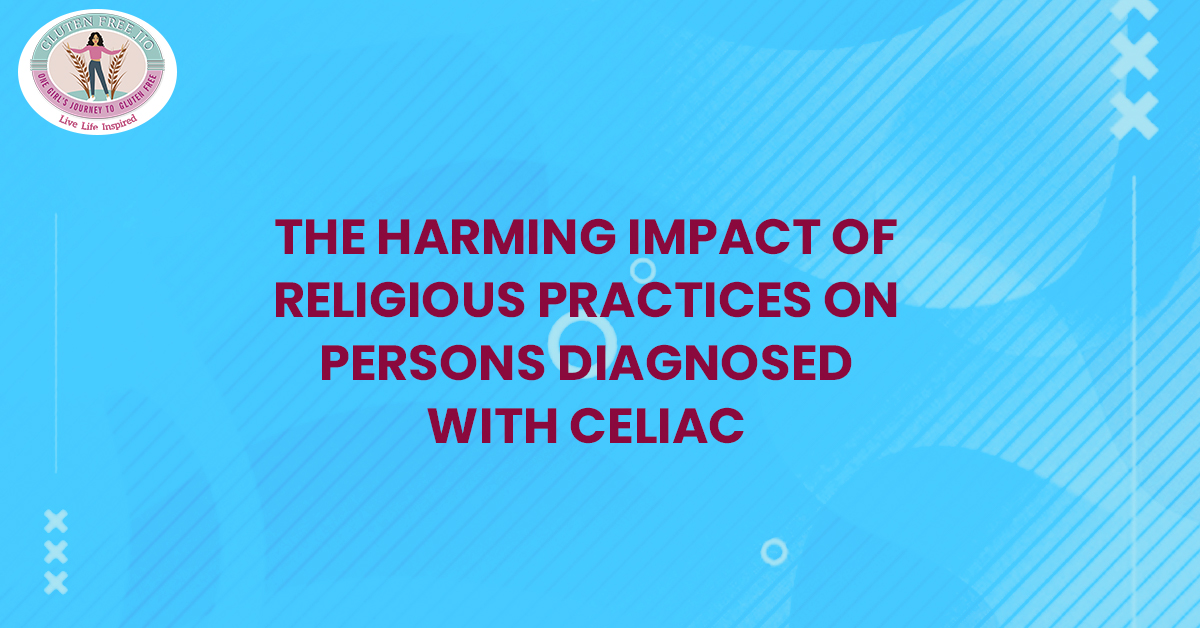The Harming Impact of Religious Practices on Persons Diagnosed with Celiac

What is it?
Celiac Disease, an autoimmune disease that affects the small intestine, impacts nearly 1% of the population in the US alone. Many cases of Celiac are actually undetected. For a doctor to order the Celiac test, there has to be the correct correlation established between the symptoms and the manner in which they occur.
The Celiac Impact
The disease is triggered by the ingestion of gluten, a protein found in grains like wheat, rye, barley, etc. It causes inflammation in the intestines, which obstructs the absorption of nutrients in the body. If left untreated, Celiac may even lead to certain cancers of the digestive system.
Bloating, constipation, diarrhea, and other gastrointestinal problems are some of the immediate reactions to gluten that a Celiac diagnosed person has to suffer.
The Remedy
The best-known way to tackle this issue by adhering to a gluten-free diet. However, it’s quite difficult to find gluten-free foods, and those that are available in the market usually come at a price. Interestingly, a study conducted found that in many cases Celiac affected persons were forced to deviate from their gluten-free diet due to religious reasons.
Religious Practices Involving Gluten Rich Foods
During the Catholic Holy Communion, for instance, one is required to eat the host, or communion bread or wafer. This is wheat bread and is an integral part of the ceremony.
However, for individuals with Celiac, it is a health concern. The only choice they have is to stick to the wine in the absence of low-gluten or gluten-free hosts. This is the same issue in Protestant churches as well.
In Judaism too, during the Passover, there is the use of matzos. The Matzo flour is made from wheat, barley, spelt, rye or oats. And while some allow the use of oat matzos or potato and tapioca matzos, not all are accepting of these variants.
The harm caused by Gluten Ingestion at Religious Ceremonies
- Physical: Research states that a Celiac patient can bear about 0.002 of one teaspoon of gluten per day. A low-gluten Communion wafer is 100ppm, so it clearly doesn’t meet its claim. And the amount of gluten in one low-gluten host is or 0.000075 of a teaspoon. Despite this, people may experience the side-effects of eating a gluten-rich wafer. The reaction to gluten, for a person who is already on a no-gluten diet, can be quite immediate.
- Psychological: Imagine being part of a congregation where everyone is doing the regular thing of having the Communion wafer or host. In the absence of a gluten-free alternative, one stands out in the crowd feeling self-conscious and at times, even ostracized. Having to explain oneself before everybody is not always the desired feeling. There is also the risk of cross-contamination if a self-brought gluten-free host is placed with the regular one on the paten.
Available Options
Many churches today are waking up to the fact that diet-related allergies and disorders are a serious concern and traditions must be altered to meet the needs of the time. Rice and soy wafers are being made available in many places and gluten-free or low-gluten hosts are also being introduced. A few nuns in Missouri even went as far as to invent wheat wafers with only a trace of gluten. This makes life very easy for people with Celiac Disease. Some churches also make provisions to keep gluten-free hosts on a different plate so as to avoid contamination by contact with its gluten variant.
Conclusion
The need of the hour is to recognize that people who suffer from food-related diseases require as much empathy as people with physical disabilities. If there can be a ramp for people in wheelchairs, gluten-free foods must also be made available to those who have an intolerance to it. This protects every individual’s right to participate in activities with equal opportunity.
 MY JOURNEY
MY JOURNEY About Me
About Me Early life
Early life Diagnosis
Diagnosis CELIAC DISEASE
CELIAC DISEASE Symptoms & Diagnosis
Symptoms & Diagnosis Treatment & Follow Up
Treatment & Follow Up GLUTEN - FREE LIVING
GLUTEN - FREE LIVING At Home
At Home At School
At School At Social Events
At Social Events
 Grocery Shopping
Grocery Shopping COMMUNITY OUTREACH
COMMUNITY OUTREACH Gluten Free Meetup
Gluten Free Meetup Workshops
Workshops Webinars
Webinars COVID-19 Camps By Gluten Free Jio
COVID-19 Camps By Gluten Free Jio  Mid Day Meal
Mid Day Meal Beyond Celiac
Beyond Celiac Real Stories of Celiac
Real Stories of Celiac RESOURCES
RESOURCES Restaurant Dining Cards
Restaurant Dining Cards Recipes
Recipes Gluten Free eBook
Gluten Free eBook Gluten Free Jio App
Gluten Free Jio App RECOGNITION
RECOGNITION TRAVEL DIARY
TRAVEL DIARY



